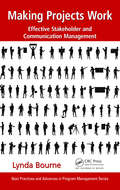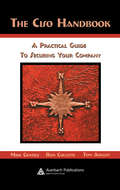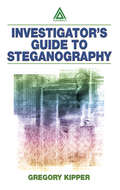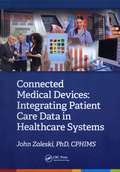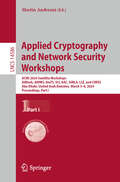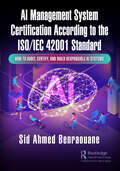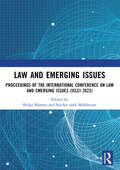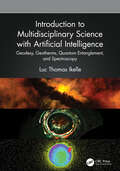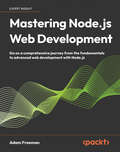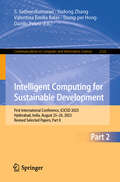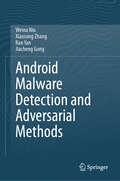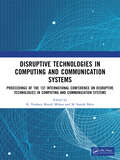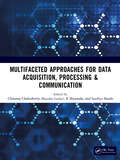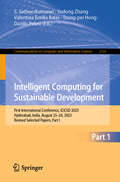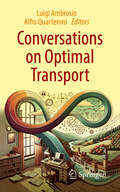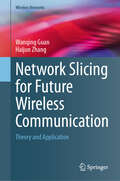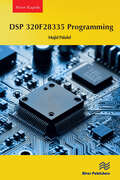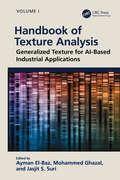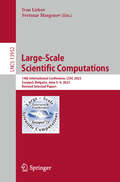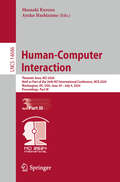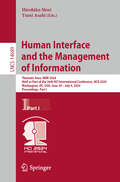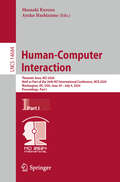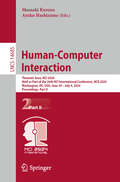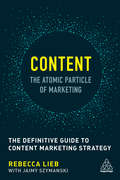- Table View
- List View
Making Projects Work: Effective Stakeholder and Communication Management (Best Practices in Portfolio, Program, and Project Management)
by Lynda BourneThis book provides a framework for understanding and managing factors required for achieving successful project and program outcomes. It presents guidelines to help readers develop an understanding of governance and its connection to strategy as the starting point for decisions on what work needs to be done. The book describes how to craft appropriate communication strategies to develop and maintain successful relationships with stakeholders. It highlights the strengths and weaknesses of existing project controls and outlines effective communication techniques for managing expectations and acquiring the support required for successful delivery.
The CISO Handbook: A Practical Guide to Securing Your Company
by Michael Gentile Ron Collette Thomas D. AugustTruly a practical work, this handbook offers a comprehensive roadmap for designing and implementing an effective information security program based on real world scenarios. It builds a bridge between high-level theory and practical execution by illustrating solutions to practical issues often overlooked by theoretical texts. This leads to a set of practices that security professionals can use every day. The framework it describes can be expanded or contracted to meet the needs of almost any organization. A reference as well as a guide, each of the chapters are self-contained and can be read in any order.
Investigator's Guide to Steganography
by Gregory KipperThe Investigator's Guide to Steganography provides a comprehensive look at this unique form of hidden communication from its beginnings to modern uses. It begins by exploring the past; providing insight into how this steganography began and evolved from ancient times to present day. It continues with an in-depth look at the workings of digital steganography and watermarking methods, available tools on the Internet, and the companies who are providing cutting edge steganography and watermarking services. The third section outlines real world uses of steganography. The book concludes by reviewing steganography detection methods and what can be expected in the future.
Connected Medical Devices: Integrating Patient Care Data in Healthcare Systems (HIMSS Book Series)
by John ZaleskiThis book explores how medical device integration (MDI) supports quality patient care and better clinical outcomes by reducing clinical documentation transcription errors, improving data accuracy and density within clinical records and ensuring the complete capture of medical device information on patients. It begins with a comprehensive overview of the types of medical devices in use and the ways in which those devices interact, then examines factors such as interoperability standards, patient identification, clinical alerts and regulatory and security considerations.
Applied Cryptography and Network Security Workshops: ACNS 2024 Satellite Workshops, AIBlock, AIHWS, AIoTS, SCI, AAC, SiMLA, LLE, and CIMSS, Abu Dhabi, United Arab Emirates, March 5–8, 2024, Proceedings, Part I (Lecture Notes in Computer Science #14586)
by Martin AndreoniThis two-volume set LNCS 14586-14587 constitutes the proceedings of eight Satellite Workshops held in parallel with the 22nd International Conference on Applied Cryptography and Network Security, ACNS 2024, held in Abhu Dabhi, United Arab Emirates, during March 5-8, 2024. The 33 full papers and 11 poster papers presented in this volume were carefully reviewed and selected from 62 submissions. They stem from the following workshops: 6th ACNS Workshop on Application Intelligence and Blockchain Security (AIBlock 2024). 5th ACNS Workshop on Artificial Intelligence in Hardware Security (AIHWS 2024). 6th ACNS Workshop on Artificial Intelligence and Industrial IoT Security (AIoTS 2024). 5th ACNS Workshop on Secure Cryptographic Implementation (SCI 2024). 1st Workshop on Advances in Asymmetric Cryptanalysis (AAC 2024). 6th ACNS Workshop on Security in Machine Learning and its Applications (SiMLA 2024). 1st Workshop on Low-Latency Encryption (LLE 2024). 4th ACNS Workshop on Critical Infrastructure and Manufacturing System Security (CIMSS 2024).
AI Management System Certification According to the ISO/IEC 42001 Standard: How to Audit, Certify, and Build Responsible AI Systems
by Sid Ahmed BenraouaneThe book guides the reader through the auditing and compliance process of the newly released ISO Artificial Intelligence standard. It provides tools and best practices on how to put together an AI management system that is certifiable and sheds light on ethical and legal challenges business leaders struggle with to make their AI system comply with existing laws and regulations, and the ethical framework of the organization.The book is unique because it provides implementation guidance on the new certification and conformity assessment process required by the new ISO Standard on Artificial Intelligence (ISO 42001:2023 Artificial Intelligence Management System) published by ISO in August 2023. This is the first book that addresses this issue.As a member of the US/ISO team who participated in the drafting of this standard during the last 3 years, the author has direct knowledge and insights that are critical to the implementation of the standard. He explains the context of how to interpret ISO clauses, gives examples and guidelines, and provides best practices that help compliance managers and senior leadership understand how to put together the AI compliance system to certify their AI system. The reader will find in the book a complete guide to the certification process of AI systems and the conformity assessment required by the standard. It also provides guidance on how to read the new EU AI Act and some of the U.S. legislations, such as NYC Local Law 144, enacted in July 2023.This is the first book that helps the reader create an internal auditing program that enhances the company’s AI compliance framework. Generative AI has taken the world by storm, and currently, there is no international standard that provides guidance on how to put together a management system that helps business leaders address issues of AI governance, AI structure, AI risk, AI audit, and AI impact analysis. ISO/IEC 42001:2023 is the first international mandatory and certifiable standard that provides a comprehensive and well-integrated framework for the issue of AI governance. This book provides a step-by-step process on how to implement the standard so the AI system can pass the ISO accreditation process.
Law and Emerging Issues: Proceedings of the International Conference on Law and Emerging Issues (ICLEI 2023)
In the ever-evolving landscape of law and governance, adaptation and innovation are key to addressing the challenges of our times. This edited volume is a testament to the ever-evolving nature of the legal field and the ongoing efforts of legal scholars and academicians to dissect, analyze, and grapple with the challenges and opportunities presented by these changes. The topics covered in this book span a wide spectrum of legal domains, reflecting the complex and rapidly changing nature of our contemporary world. From corporate governance structures to emerging challenges in the digital space, from analyzing the implications of the Social Security Code 2020 in India to understanding the legal developments surrounding unorganized migrant workers during the COVID-19 pandemic, the breadth of subjects addressed here is both impressive and vital.
Introduction to Multidisciplinary Science with Artificial Intelligence: Geodesy, Geotherms, Quantum Entanglement, and Spectroscopy
by Luc Thomas IkelleThe book is about multidisciplinary science education. The challenges of our time, such as improving the length and quality of lives on Earth and short- and long-distance communication and transportation. In this book, we provide readers with the multidisciplinary education necessary to meet the scientific and technological challenges of our time while optimizing the college experience for students. The fundamental notions addressed in this book include gravitational forces and energy; dark matter and dark energy; heat transfer in solid Earth, stars’ interiors, and human bodies; electromagnetic radiation and spectroscopy; quantum entanglement and computing; accretion disks; matter in plasma state; and exoplanets. We illustrate the importance of these notions with applications across disciplines, including monitoring the deformation of the solid Earth’s surface using satellite measurements, unusual gravity anomalies in Antarctica, a view and characterization of the far side of our Moon, Earth’s climate, Titan’s anti-greenhouse effect, long-distance communication between Earth and the planets and exoplanets, etc. Finally, the book contains analytical and computational problems, including MATLAB software developed especially for the classes associated with this book.Key Features:• Contains multiple analytic and computational (MATLAB) exercises• Explores applications related to space programs' discoveries• Provides an accessible introduction and response to growing Multidisciplinary Science programsDr. Luc Thomas Ikelle is a scientist with Imode Energy. He is also currently an adjunct professor in the Department of Geology and Geophysics at Texas A&M University. Previously, he worked at Cray Research Inc. in Minneapolis, developing 3D seismic inversion algorithms for CRAY Y-PM. From 1988 to 1997, he worked as a scientist for Schlumberger Geco-Prakla, Schlumberger Doll Research, and Schlumberger Cambridge Research. From 1997 to 2014, Dr. Ikelle was Robert R. Berg Professor in the Department of Geology and Geophysics at Texas A&M University. He earned a Ph.D. in geophysics and geochemistry from Paris 7 University in France. He received Le Prix de Thesis du CNRS in 1986 for his Ph.D. thesis, an SEG award in 2010 for his contribution to the creation of Geoscientists Without Borders, and a Texas AM University award as an outstanding scientist in 2012. He is a cofounder of Geoscientists Without Borders and of Imode Energy Research, and a member of SEG, AGU, and APS. Dr. Ikelle has worked as a DOE (US Department of Energy) special employer from 2005 to 2012 and was a member of Ultra-Deepwater Advisory Committee (an advisory committee to the Secretary of Energy) from 2005 to 2012.
Mastering Node.js Web Development: Go on a comprehensive journey from the fundamentals to advanced web development with Node.js
by Adam FreemanUnlock the full potential of Node.js with practical skills to develop and deploy scalable and high-performance server-side applications that enhance your client-side projects Purchase of the print or Kindle book includes a free PDF eBookKey FeaturesServer-side applications with Node.js, covering HTTP requests, static and dynamic content delivery, form data processing, and RESTful web servicesHands-on examples, step-by-step code listings, and best practices for building and deploying server applicationsCommon services like authentication, managing application state, and performance optimizationBook DescriptionDive into the world of Node.js with this comprehensive guide, taking you from foundational concepts to practical web development mastery. Written by an industry veteran with over 50 programming books under his belt, this book will help both beginners and seasoned developers. Gain a deep understanding of the most important server-side features in web development with Node.js. The first part of the book will get you up to speed with basic features of Node.js and TypeScript. In the second part, you’ll elevate your skills by creating simplified implementations of key server-side features to understand how they work and how they are presented to clients. Armed with the understanding gained from implementing each feature, you will be able to replace custom code with production-ready open-source packages. The third part will help you understand how server-side features are combined for practical web development. Using Adam Freeman’s signature SportsStore application, you will learn how to develop client and server-side components, culminating in a thorough application deployment preparation. By the end of this Node.js book, you will be able to build and deploy server applications to support HTTP clients, including JavaScript applications created with frameworks such as Angular and React.What you will learnProcess HTTP requests and perform file operationsCreate RESTful web services that can be consumed by client-side appsWork with server apps serving JavaScript clients, such as React and AngularLeverage Node.js to work with popular databasesApply practical knowledge through building the SportsStore projectAuthenticate users and authorize access to application featuresWho this book is forThis book is for programmers with a basic knowledge of HTML and CSS who are transitioning into JavaScript development and are looking to master the implementation of server-side applications.
API Testing and Development with Postman: API creation, testing, debugging, and management made easy
by Dave WesterveldAvoid common API coding pitfalls and make test automation effortless with Postman and the Newman CLIKey FeaturesLearn the tenets of effective API testing and design with workflow testing and moreGain an in-depth understanding of Postman’s new and existing features, including Mock ServersKnow when and how to use Postman to create high-quality APIs for software and web appsBook DescriptionPostman is an invaluable tool for exploration and testing of web APIs and helping testers and developers figure out how an API works. With Postman, you can create effective test automation for any APIs, and this guide will help you unleash its full potential. API Testing and Development with Postman is an invaluable resource for anyone who wants to create a good quality API, but isn't sure how to go about it. This guide will help you unleash the full potential of Postman’s test automation capabilities. A combination of theory coupled with real-world examples will help you learn how to use Postman to create well-designed, documented, and tested APIs. After you’ve familiarized yourself with the theory, you’ll move on to hands-on projects that will teach you how to add test automation to an existing API. You’ll also learn some of the new and powerful features that Postman has that can help you avoid introducing bugs. This second, fully updated edition features new chapters on workflow testing, creating and using mock servers, API security testing, and performance testing. The new and expanded information in this edition will help you future-proof your APIs. By the end of this book, you'll be able to use Postman to set up and run API tests for any API that you are working with.What you will learnFind out what is involved in effective API testingLeverage Postman to improve the quality of you APIUse data-driven testing in Postman to create scalable API testsHow to create and use a Mock Server in PostmanVerify and improve the quality of an API using contract testingUnderstand the basic principles of security testingGet to grips with functional and non-functional testing of an APIDiscover how to use industry standards such as OpenAPI and mockingWho this book is forThe book is for software testing professionals and software developers looking to improve product and API quality through API test automation. You’ll also find this book useful if you have a basic understanding of APIs and want to build your skills for creating, testing, and documenting them. The book assumes beginner-level knowledge of JavaScript and API development.
Intelligent Computing for Sustainable Development: First International Conference, ICICSD 2023, Hyderabad, India, August 25–26, 2023, Revised Selected Papers, Part II (Communications in Computer and Information Science #2122)
by Tzung-Pei Hong Valentina Emilia Balas Danilo Pelusi Yudong Zhang S. SatheeskumaranThe two-volume proceedings set CCIS 2121 and 2122 constitutes the refereed proceedings of the First International Conference on Intelligent Computing for Sustainable Development, ICICSD 2023, which took place in Hyderabad, India, during August 25–26, 2023. The 46 papers included in these proceedings were carefully reviewed and selected from 138 submissions. They focus on digital healthcare, renewable energy, smart cities, digital farming, and autonomous systems.
Android Malware Detection and Adversarial Methods
by Xiaosong Zhang Weina Niu Ran Yan Jiacheng GongThe rise of Android malware poses a significant threat to users’ information security and privacy. Malicious software can inflict severe harm on users by employing various tactics, including deception, personal information theft, and device control. To address this issue, both academia and industry are continually engaged in research and development efforts focused on detecting and countering Android malware. This book is a comprehensive academic monograph crafted against this backdrop. The publication meticulously explores the background, methods, adversarial approaches, and future trends related to Android malware. It is organized into four parts: the overview of Android malware detection, the general Android malware detection method, the adversarial method for Android malware detection, and the future trends of Android malware detection. Within these sections, the book elucidates associated issues, principles, and highlights notable research. By engaging with this book, readers will gain not only a global perspective on Android malware detection and adversarial methods but also a detailed understanding of the taxonomy and general methods outlined in each part. The publication illustrates both the overarching model and representative academic work, facilitating a profound comprehension of Android malware detection.
Disruptive technologies in Computing and Communication Systems: Proceedings of the 1st International Conference on Disruptive technologies in Computing and Communication Systems
by K. Venkata Murali Mohan M. Suresh BabuThe 1st International Conference on Disruptive Technologies in Computing and Communication Systems (ICDTCCS - 2023) has received overwhelming response on call for papers and over 119 papers from all over globe were received. We must appreciate the untiring contribution of the members of the organizing committee and Reviewers Board who worked hard to review the papers and finally a set of 69 technical papers were recommended for publication in the conference proceedings. We are grateful to the Chief Guest Prof Atul Negi, Dean – Hyderabad Central University, Guest of Honor Justice John S Spears -Professor University of West Los Angeles CA, and Keynote Speakers Prof A. Govardhan, Rector JNTU H, Prof A.V.Ramana Registrar – S.K.University, Dr Tara Bedi Trinity College Dublin, Prof C.R.Rao – Professor University of Hyderabad, Mr Peddigari Bala, Chief Innovation Officer TCS, for kindly accepting the invitation to deliver the valuable speech and keynote address in the same. We would like to convey our gratitude to Prof D. Asha Devi - SNIST, Dr B.Deevena Raju – ICFAI University, Dr Nekuri Naveen - HCU, Dr A.Mahesh Babu - KLH, Dr K.Hari Priya – Anurag University and Prof Kameswara Rao –SRK Bhimavaram for giving consent as session Chair. We are also thankful to our Chairman Sri Teegala Krishna Reddy, Secretary Dr. T.Harinath Reddy and Sri T. Amarnath Reddy for providing funds to organize the conference. We are also thankful to the contributors whose active interest and participation to ICDTCCS - 2023 has made the conference a glorious success. Finally, so many people have extended their helping hands in many ways for organizing the conference successfully. We are especially thankful to them.
Multifaceted approaches for Data Acquisition, Processing & Communication
by K. Shyamala Chinmay Chakraborty Manisha Guduri B. SandhyaThe objective of the conference is to bring to focus the recent technological advancements across all the stages of data analysis including acquisition, processing, and communication. Advancements in acquisition sensors along with improved storage and computational capabilities, have stimulated the progress in theoretical studies and state-of-the-art real-time applications involving large volumes of data. This compels researchers to investigate the new challenges encountered, where traditional approaches are incapable of dealing with large, complicated new forms of data.
Intelligent Computing for Sustainable Development: First International Conference, ICICSD 2023, Hyderabad, India, August 25–26, 2023, Revised Selected Papers, Part I (Communications in Computer and Information Science #2121)
by Tzung-Pei Hong Valentina Emilia Balas Danilo Pelusi Yudong Zhang S. SatheeskumaranThe two-volume proceedings set CCIS 2121 and 2122 constitutes the refereed proceedings of the First International Conference on Intelligent Computing for Sustainable Development, ICICSD 2023, which took place in Hyderabad, India, during August 25–26, 2023. The 46 papers included in these proceedings were carefully reviewed and selected from 138 submissions. They focus on digital healthcare, renewable energy, smart cities, digital farming, and autonomous systems.
Conversations on Optimal Transport
by Luigi Ambrosio Alfio QuarteroniThis work is closely tied to the renowned mathematics textbook series known as UNITEXT, tailored for university students pursuing bachelor’s or master’s degrees. What sets this particular book apart in the Springer collection is its unique origin: it has been crafted through a meticulous process involving interviews handled with and by world-class mathematicians. The content featured in this book revolve around a highly relevant and engaging topic: Optimal Transport. These conversations involve not only authors from the UNITEXT series, but also members of the series’ Editorial Board. Additionally, they feature prominent figures in the field, including a Field Medalist. This work provides readers with a snapshot of remarkable vitality and freshness, guaranteed to captivate and engage anyone with an interest in mathematics. It’s important to note that these interviews were initially shared as podcasts and originally broadcasted as online events on the Cassyni platform. Subsequently, advanced AI tools were employed under human supervision to transcribe the audios and edit them for better readability. A human copy-editor was involved during the whole process, and the authors revised the final copy-edited texts before publication. The content in each format – the interviews, the PODCASTS and the book – is self-contained and not a mere adaptation from one medium to another. Instead, it represents an independent exploration of the subject matter.
Network Slicing for Future Wireless Communication: Theory and Application (Wireless Networks)
by Haijun Zhang Wanqing GuanThis book comprehensively discusses the development, application and challenges of network slicing technology in wireless communications. Starting with the basic concept and enabling technologies of network slicing, this book introduces how to integrate AI (Artificial Intelligence) technology into the end-to-end deployment, resource allocation and performance enhancement for multi-tenant slicing. An in-depth exploration of managing multi-domain slices deployed in the federated infrastructure networks is presented, including on-demand cooperation among multiple infrastructure networks, distinct slice deployment, hierarchical slice orchestration and fast slice adaption. As a guide to leveraging AI to enhance traffic performance of multi-tenant slicing and customize resource slicing for industrial scenarios, this book provides insights, modeling, applications and research issues. A holistic perspective on prominent role of network slicing in managing wireless network resources is provided as well. Overall, network slicing as a key technology of wireless networks, enables to satisfy differentiated service demands of multiple tenants from vertical industries with the same shared physical infrastructure network. As future wireless networks are expected to facilitate the evolution of vertical industries, various vertical enterprises as tenants require an intelligent network slicing paradigm to provide highly customizable services. AI-based management system for network slicing excel at deploying slices rapidly, allocating resources efficiently and avoiding service quality degradation. With the increasing diversity of service demands and complexity of communication environment, incorporating AI into network slicing is a necessity for improving flexibility and automation of resource management. This book targets advanced-level students in information and communication sciences as a secondary textbook. Researchers and industry professionals working in various areas, such as wireless communication systems, network management and orchestration, resource allocation and AI-enabled wireless networks will also find this book useful as reference book.
DSP 320F28335 Programming
by Majid PakdelThis book provides a comprehensive, practical approach to understanding and implementing the programming concepts of the DSP 320F28335 microcontroller. It is an indispensable guide for both seasoned professionals and beginners interested in mastering the complexities of programmable digital signal processors (DSPs).Inside, you will embark on a journey through the world of DSPs, exploring various programming techniques and strategies tailored specifically for the 320F28335 microcontroller. From the fundamentals of DSP programming to advanced signal processing algorithms, this book covers it all. Each chapter is carefully crafted, offering clear explanations, step-by-step examples, and hands-on exercises to reinforce your learning. You will learn how to harness the power of the 320F28335 microcontroller to develop real-time applications.Whether you are a seasoned programmer looking to expand your knowledge or a beginner ready to dive into the world of DSPs, "DSP 320F28335 Programming"" will be your ultimate companion. With its comprehensive coverage, insightful explanations, and practical examples, this book is a must-have resource for anyone aiming to excel in the realm of digital signal processing programming.
Handbook of Texture Analysis: Generalized Texture for AI-Based Industrial Applications
by Jasjit S. Suri Ayman El-Baz Mohammed GhazalThe major goals of texture research in computer vision are to understand, model, and process texture, and ultimately, to simulate the human visual learning process using computer technologies. In the last decade, artificial intelligence has been revolutionized by machine learning and big data approaches, outperforming human prediction on a wide range of problems. In particular, deep learning convolutional neural networks (CNNs) are particularly well suited to texture analysis. This book examines four major application domains related to texture analysis and their relationship to AI-based industrial applications: texture classification, texture segmentation, shape from texture, and texture synthesis. This volume: Discusses texture-based segmentation for extracting image shape features, modeling and segmentation of noisy and textured images, spatially constrained color-texture model for image segmentation, and texture segmentation using Gabor filters Examines textural features for image classification, a statistical approach for classification, texture classification from random features, and applications of texture classifications Describes shape from texture, including general principles, 3D shapes, and equations for recovering shape from texture Surveys texture modeling, including extraction based on Hough transformation and cycle detection, image quilting, gray level run lengths, and use of Markov random fields Aimed at researchers, academics, and advanced students in biomedical engineering, image analysis, cognitive science, and computer science and engineering, this is an essential reference for those looking to advance their understanding in this applied and emergent field.
Large-Scale Scientific Computations: 14th International Conference, LSSC 2023, Sozopol, Bulgaria, June 5–9, 2023, Revised Selected Papers (Lecture Notes in Computer Science #13952)
by Ivan Lirkov Svetozar MargenovThis book constitutes the refereed proceedings of the 14th International Conference on Large-Scale Scientific Computations, LSSC 2023, held in Sozopol, Bulgaria, during June 5–9, 2023. The 49 full papers included in this book were carefully reviewed and selected from 61 submissions. They were organized in topical sections as follows: preconditioning and multilevel methods; fractures and mixed dimensional modeling: discretizations, solvers, and methodology; machine learning and model order reduction for large scale predictive simulations; fractional differential problems: theoretical aspects, algorithms and applications; variational analysis and optimal control; stochastic optimal control and numerical methods in economics and finance; tensor methods for big data analytics and low-rank approximations of PDEs solutions; applications of metaheuristics to large-scale problems; large-scale models: numerical methods, parallel computations and applications; HPC and HPDA: algorithms and applications.
Human-Computer Interaction: Thematic Area, HCI 2024, Held as Part of the 26th HCI International Conference, HCII 2024, Washington, DC, USA, June 29 – July 4, 2024, Proceedings, Part III (Lecture Notes in Computer Science #14686)
by Masaaki Kurosu Ayako HashizumeThis five-volume set LNCS 14684-14688 constitutes the refereed proceedings of the Human Computer Interaction thematic area of the 26 International Conference on Human-Computer Interaction, HCII 2024, held in Washington, DC, USA, during June 29 – July 4, 2024. The total of 1271 papers and 309 posters included in the HCII 2024 proceedings was carefully reviewed and selected from 5108 submissions. The VAMR 2024 proceedings were organized in the following topical sections: Part I: HCI Theory and Design and Evaluation Methods and Tools; Emotions in HCI. Part II: Human-Robot Interaction; Child-Computer Interaction. Part III: HCI for Mental Health and Psychological Wellbeing; HCI in Healthcare. Part IV: HCI, Environment and Sustainability; Design and User Experience Evaluation Case Studies. Part V: Multimodality and Natural User Interfaces; HCI, AI, Creativity, Art and Culture.
Human Interface and the Management of Information: Thematic Area, HIMI 2024, Held as Part of the 26th HCI International Conference, HCII 2024, Washington, DC, USA, June 29–July 4, 2024, Proceedings, Part I (Lecture Notes in Computer Science #14689)
by Hirohiko Mori Yumi AsahiThis three-volume set LNCS 14789-14791 constitutes the thoroughly refereed proceedings of the thematic area Human Interface and the Management of Information, HIMI 2024, held as part of the 26th International Conference on Human-Computer Interaction, HCI International 2024 (HCII 2024), was held as a hybrid event in Washington DC, USA, during June/July 2024. The total of 1271 papers and 309 posters included in the HCII 2023 proceedings was carefully reviewed and selected from 5108 submissions. The HIMI conference addressed approaches and objectives of information and data design, retrieval, presentation and visualization, management, and evaluation in human computer interaction in a variety of application domains, such as, for example, learning, work, decision, collaboration, medical support, and service engineering, and much more.
Human-Computer Interaction: Thematic Area, HCI 2024, Held as Part of the 26th HCI International Conference, HCII 2024, Washington, DC, USA, June 29 – July 4, 2024, Proceedings, Part I (Lecture Notes in Computer Science #14684)
by Masaaki Kurosu Ayako HashizumeThis five-volume set LNCS 14684-14688 constitutes the refereed proceedings of the Human Computer Interaction thematic area of the 26 International Conference on Human-Computer Interaction, HCII 2024, held in Washington, DC, USA, during June 29 – July 4, 2024. The total of 1271 papers and 309 posters included in the HCII 2024 proceedings was carefully reviewed and selected from 5108 submissions. The VAMR 2024 proceedings were organized in the following topical sections: Part I: HCI Theory and Design and Evaluation Methods and Tools; Emotions in HCI. Part II: Human-Robot Interaction; Child-Computer Interaction. Part III: HCI for Mental Health and Psychological Wellbeing; HCI in Healthcare. Part IV: HCI, Environment and Sustainability; Design and User Experience Evaluation Case Studies. Part V: Multimodality and Natural User Interfaces; HCI, AI, Creativity, Art and Culture.
Human-Computer Interaction: Thematic Area, HCI 2024, Held as Part of the 26th HCI International Conference, HCII 2024, Washington, DC, USA, June 29 – July 4, 2024, Proceedings, Part II (Lecture Notes in Computer Science #14685)
by Masaaki Kurosu Ayako HashizumeThis five-volume set LNCS 14684-14688 constitutes the refereed proceedings of the Human Computer Interaction thematic area of the 26 International Conference on Human-Computer Interaction, HCII 2024, held in Washington, DC, USA, during June 29 – July 4, 2024. The total of 1271 papers and 309 posters included in the HCII 2024 proceedings was carefully reviewed and selected from 5108 submissions. The VAMR 2024 proceedings were organized in the following topical sections: Part I: HCI Theory and Design and Evaluation Methods and Tools; Emotions in HCI. Part II: Human-Robot Interaction; Child-Computer Interaction. Part III: HCI for Mental Health and Psychological Wellbeing; HCI in Healthcare. Part IV: HCI, Environment and Sustainability; Design and User Experience Evaluation Case Studies. Part V: Multimodality and Natural User Interfaces; HCI, AI, Creativity, Art and Culture.
Content - The Atomic Particle of Marketing: The Definitive Guide to Content Marketing Strategy
by Rebecca LiebDISTINGUISHED FAVOURITE: NYC Big Book Awards 2017Content, in all its forms, is the single most critical element of any marketing campaign. Finding a successful equilibrium between content marketing and content strategy is difficult, but essential. Content - The Atomic Particle of Marketing goes beyond superficial descriptions of how to produce engaging social media content to offer the results of many years of deep quantitative research, and hours of interviews with senior marketers at some of the world's leading brands. Written by a recognized industry thought leader, Content - The Atomic Particle of Marketing explores how content functions in the broader framework of all marketing, as well as organizational concerns and IT decision making. It demonstrates the value content brings not only to "owned" media initiatives, such as a company website or blog, but also the essential role content plays in all other marketing initiatives, from social media to advertising to offline channels. It will enable readers to make the organizational, staffing, tools and process decisions necessary to get content up and running across divisions and organizational silos. Deeply researched and insightful, Content - The Atomic Particle of Marketing is, quite simply, the definitive research-based guide to content marketing.
